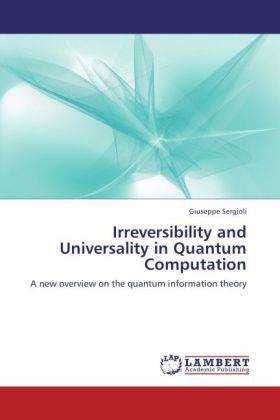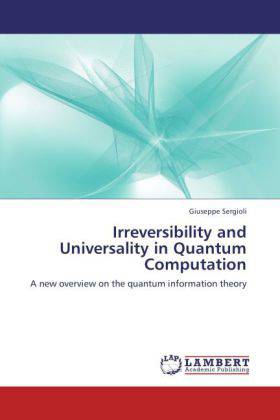
- Afhalen na 1 uur in een winkel met voorraad
- Gratis thuislevering in België vanaf € 30
- Ruim aanbod met 7 miljoen producten
- Afhalen na 1 uur in een winkel met voorraad
- Gratis thuislevering in België vanaf € 30
- Ruim aanbod met 7 miljoen producten
Zoeken
Irreversibility and Universality in Quantum Computation
A new overview on the quantum information theory
Giuseppe Sergioli
Paperback | Engels
€ 48,45
+ 96 punten
Omschrijving
In this book I discuss an approach to quantum computation where the basic information units (qubits and quregisters) are replaced by density operators and the restriction to unitary operators as logical gates is lifted through the introduction of the more general concept of quantum operation. This perspective is especially suited to provide a physical description of open systems. In particular, we illustrate the advantages of this approach over the standard one and show that it can account for two important irreversible transformations already considered in the literature: the irreversible conjunction IAND and the fuzzy-like Lukasiewicz disjunction. The introduction of these new transformations allow us to investigate about the possibility to obtain reasonable conequences on the problem of university in quantum computation.
Specificaties
Betrokkenen
- Auteur(s):
- Uitgeverij:
Inhoud
- Aantal bladzijden:
- 84
- Taal:
- Engels
Eigenschappen
- Productcode (EAN):
- 9783846551004
- Verschijningsdatum:
- 5/01/2012
- Uitvoering:
- Paperback
- Formaat:
- Trade paperback (VS)
- Afmetingen:
- 152 mm x 229 mm
- Gewicht:
- 136 g

Alleen bij Standaard Boekhandel
+ 96 punten op je klantenkaart van Standaard Boekhandel
Beoordelingen
We publiceren alleen reviews die voldoen aan de voorwaarden voor reviews. Bekijk onze voorwaarden voor reviews.











